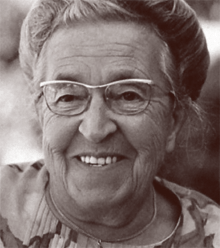 Last week’s Monday Memo (The Clanging of the Bell) told a story about Corrie Ten Boom’s struggle to forgive some friends who had taken advantage of her. Eventually, she forgave them to the extent that their friendship and fellowship were restored.
Last week’s Monday Memo (The Clanging of the Bell) told a story about Corrie Ten Boom’s struggle to forgive some friends who had taken advantage of her. Eventually, she forgave them to the extent that their friendship and fellowship were restored.
Many years later, an American friend who was familiar with the story came to visit her in Holland. They spent the evening together — Corrie, her American friend, and the ones with whom she had had the conflict.
At the end of the evening, as the group left, her friend asked, “Aren’t those the people who let you down?”
Corrie replied, (rather smugly, by her own admission), “Yes. You can see it’s all forgiven.”
And then she said, “But they still don’t see it like I see it. They still say there was nothing to forgive. They deny it ever happened. But I can prove it. I have it in black and white. I still have the letters and documents.”
Her friend paused for a moment, and then gently asked, “Corrie, aren’t you the one who said your sins are at the bottom of the sea? Why, then, are the sins of your friends still etched in black and white?”
She could think of nothing to say, except, “Lord Jesus, forgive me for preserving — all these years — the evidence against others.”
Before she went to sleep that night, she removed those letters and documents from her desk and tossed them in the furnace.
Paul said that we are to forgive others as Christ has forgiven us. How does he forgive us?
“I—yes, I alone—will blot out your sins for my own sake and will never think of them again.” (Isaiah 43:25)
That’s our goal in forgiving others.
One of the greatest gifts you can give to others is to leave the past in the past. When you forgive someone and let it go … when you make the deliberate choice to think of it never again … you set mercy in motion — in their life, and yours.
. . . . . . . . . . .
[Today’s post was adapted from Steve’s sermon: The Spark of Forgiveness.]




